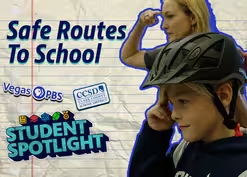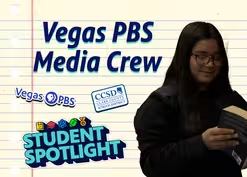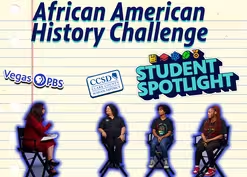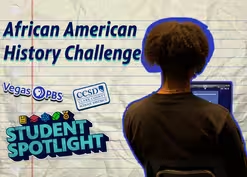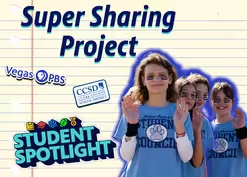
ONLINE EXTRA: Foothill HS students interview Trustee Guzmán
Clip: Season 3 Episode 6 | 14m 25sVideo has Closed Captions
Foothill HS students Chris and Shiloh interview CCSD School Trustee Lisa Guzmán.
Foothill HS students Chris and Shiloh ask CCSD School Trustee Lisa Guzmán about why she became a trustee and why she is not running for re-election. They also ask about funding, class sizes and teacher salaries in this in-depth interview.
Problems playing video? | Closed Captioning Feedback
Problems playing video? | Closed Captioning Feedback
Student Spotlight is a local public television program presented by Vegas PBS

ONLINE EXTRA: Foothill HS students interview Trustee Guzmán
Clip: Season 3 Episode 6 | 14m 25sVideo has Closed Captions
Foothill HS students Chris and Shiloh ask CCSD School Trustee Lisa Guzmán about why she became a trustee and why she is not running for re-election. They also ask about funding, class sizes and teacher salaries in this in-depth interview.
Problems playing video? | Closed Captioning Feedback
How to Watch Student Spotlight
Student Spotlight is available to stream on pbs.org and the free PBS App, available on iPhone, Apple TV, Android TV, Android smartphones, Amazon Fire TV, Amazon Fire Tablet, Roku, Samsung Smart TV, and Vizio.
Providing Support for PBS.org
Learn Moreabout PBS online sponsorshipAll right.
Good morning, Miss Guzman.
How's it going today?
Today is a great day.
It is not raining.
It's a let's just jump right into the interview here.
So why did you want to become a trustee for 60?
That is a good question and a question that I'm asked a lot.
When I ran for trustee.
I had been working as the executive director of the Education Support Employees Association.
And one thing that I noticed is the culture of the district.
And I wanted to change it.
I wanted employees to feel respected, to feel like they were excited to come to school because their working environment is a student's learning environment.
And if a staff member is excited to be here, then the students will be excited to be here.
And that was really important to me.
And what I was finding was that employees were not excited to be at school sites and students there.
There was fighting and things.
Remember that when I decided to run, it was pre-COVID.
Actually, the Friday before that I filed to run for Trustee was the Friday before everything shut down.
So and I actually have worked towards changing the culture in the district.
So why.
So you've announced that you're not running for reelection.
you read my Twitter.
Why have you decided to not rerun?
So that's a great question.
So being a trustee takes a lot of time.
People don't realize it.
They think that it's just one Wednesday work session and a couple of school board meetings.
But actually, it's a full time job.
And I also have a full time job.
And so it takes a lot out of you.
And one of the things that I really worked hard to do is connect with the community.
I wanted the community to know who their trustee was.
Because when I started living in the community, I didn't know.
And one of the things that I really enjoy is, is watching meetings.
So I started watching my school board meetings, just trying to figure out how things were run here.
My son at the time was a junior in high school, and I was trying to determine where he was going to go to high school.
And and I noticed that when I asked my neighbor, Do you know who our trustee is?
She had no idea.
And I didn't want that to happen.
All of my neighbors know I'm their trustee, you know, and and when I go to the grocery store, people do recognize me.
Is it the purple hair?
Maybe.
Maybe.
But they know I'm their trustee and they're excited to meet me, to talk to me.
And and I have loved that.
But I don't see running again and going through the same type of four three voting block as being positive for the district.
I think someone else needs to step in my place and not be a lightning rod the way I am and and advocate for our kids.
So with advocating for the students in the Henderson and the county school district as a whole, we're range very low nationally.
What can we do to improve student achievement?
So it's a really great question because I've really thought about this like it is something that I think about when I wake up every day, because it's not just 60, it's across the state.
We're ranked poorly, right?
And it is our school funding.
It truly is the funding because, for example, if you live 2.8 miles away from a school, you may or may not get a bus that's almost three miles that a kid has to walk to school.
Do you really think that in the rain they're going to walk to school or are they going to be absent that day?
Right.
And so in my mind, I'm thinking we need money for the busses.
We don't just need money for busses.
We need money for the bus driver.
We need money for the teachers that are going to actually be there because they won't be absent any more.
We're going to need money for that support staff that's going to support them.
So the reason why we're so low is money.
And if we hadn't had our Esser funds or the ARPA funds, we wouldn't have our Tier one instruction that we have right now because the state doesn't fund us properly.
If you take into account our Esser funds and, and the funding that the that the state that gave us were higher ranked.
But if you take Esser funds out we're 49th and we just stay 49th because that is the way the state funds us.
So you mentioned funding and how important funding is to building up the district.
I know a lot of my teachers have to pay out of their pocket to get classroom supplies for all of their students.
How are you going to ensure that we get this funding into our classrooms so teachers don't have to pay out of their pocket?
And we get supplies for all students?
So this is a discussion that the trustees have a lot because we don't understand why schools have carry forward money.
But teachers are putting stuff on donors shoes we don't understand.
There is a school in our district that has a $6 million carry forward.
Carry forward is the extra money that they have beyond their budget.
And yet their teachers are asking for money for their classrooms and donors choose.
We find that to be confusing, right?
So we asked Jason Gowdy, who is the CFO, why this is happening.
And it's communication.
Teachers should not be reaching in their pockets to fund supplies for their classrooms.
They should be talking to their principals and their S.O.
ts and asking for that funding because if their school has a carry forward, if they have extra money, it should be going right into those classrooms that is the whole point of AB 469 and keeping money locally in the schools is so that the teachers would have that money.
Do you believe that like this communication issue do?
How would you incentivize teachers so they know that they have to ask their principals and other staff members that to get this money?
So that's a that again, we go back to why I ran for trustee and the culture.
So the culture is for teachers to ask others for money for their classrooms.
Right.
We need to change that culture.
So it starts at the top.
It starts with me.
Absolutely.
And getting that message out.
We've mentioned it many times at our board meetings, but we're not getting that message out.
So we take opportunities like this to speak to students, to speak to educators, to get that message out, because we don't think it's coming from the top.
We don't think people are getting that message.
And if we're not telling the message to the administrators in the in the appropriate way so that they get the message to the principals, so that the principals get the message to the educators.
If we're not doing that right, then that's why they're asking for donors.
Choose that in the fact that the state has promoted it, But essentially they don't need to.
Moving on.
Some of our classrooms have upwards of 40 students in them, meaning we're not getting the one on one time with our teachers that we need.
For example, in my English classroom, there's over 40 of us and my teacher, Miss Buck, doesn't even have enough time to come around the classroom and say good morning to all of us, because she immediately has to jump in and there's 40 faces trying to get her attention.
What are we going to do to minimize the amount of students in a classroom so they get that one on one time with their teachers?
It's a great question, and it is one that we have been trying to answer for as long as I've lived in Nevada.
And and the thing is that I truly believe that students need to talk to their legislators because the whole reason why we don't have enough educators so that we have smaller class sizes is because we don't pay them well.
We don't.
And if we were to pay our educators, well, then people would want to go into the education profession and we would have more teachers and we would have smaller class sizes.
We don't have that.
We need students because a adults, we talk to legislators, we tell them we need smaller class size.
They don't they don't feel the fire in the belly to to address this issue.
And they would if students were to talk to them and say, we need this.
It is the same for all electeds.
If you ask an elected to do something and you are a student, they are more likely to listen than an adult who is not at all really touched by it.
Okay.
You mentioned that we're not paying our teachers enough.
What are we doing to incent, incentivize teachers staying within the district?
That's a good question.
The trustees wanted to do that.
It's complicated because of the negotiation process.
So in my daytime job, I work for the Nevada State Education Association, which is the statewide union.
And what what unions do is they negotiate contracts and they try to do everything they can to keep their members in in the districts, at least in my in my union.
I don't know about the teachers union here in Clark County because they left my organizing session when I was a new person.
So what I do know is that trustees want to keep our our educators in the classrooms.
We absolutely want them.
Our job is to give money to to allocate money to negotiate how the union and the the administrators determine how that money is used is done at the bargaining table.
We don't have any say in that.
We only approve what is done at the end.
Right.
So in our mind, when negotiations are completed, that means that the teachers are happy with what occurred.
What we found out this last time is that that's not what happened.
Right.
But we thought that they were.
And so we approved it.
Actually, it'll be approved on tonight's agenda.
Yeah.
So we'll see what you know.
We're trying to keep our educators.
We really are.
We talk to our educators all the time, try to find solutions.
But it has to come through the unions.
So you mentioned the the current contract negotiation with the new pay scale.
Newly hired teachers make more than newly hired teachers with the same amount of experience, make more than veteran teachers in the district.
How we how else can we ensure that veteran teachers don't feel disrespected and decide to leave our district?
So that is going to have to be a subject of bargaining.
It has to be.
We know as trustees that the most important person in a classroom besides our students is a teacher.
We know that.
We also know that there are educators coming to our board meetings who are letting us know that if they leave the district for three years and come back, they'll make more money.
And that scares us.
We don't want them to leave.
And so we have to find a solution.
What that looks like.
I, I don't know, because, again, it has to be done at the bargaining table.
But you're right.
We need to find a way to make them feel respected.
You're right.
Awesome.
I think that's everything we have for you today.
Thank you for joining us.
Well, thanks for having me.
I really appreciate your time and asking me these really thoughtful questions.
Of course.
We're glad to have you.
Thanks.
A Closer Look at Safe Routes to School
Video has Closed Captions
Clip: S3 Ep6 | 3m 4s | Visit Smalley ES as students learn how to get to and from school safely. (3m 4s)
Ezekiel from the Vegas PBS Media Crew Reports on The Post
Video has Closed Captions
Clip: S3 Ep6 | 4m | Sierra Vista HS student Ezekiel explores a college and career resource at his school. (4m)
Meet Thurman White Academy’s Show Choir!
Video has Closed Captions
Clip: S3 Ep6 | 2m 56s | Thurman White Academy of the Performing Arts students talk about why they love performing. (2m 56s)
ONLINE EXTRA: African American History Challenge
Video has Closed Captions
Clip: S3 Ep6 | 5m 40s | Maria talks to an organizer and competitors about the African American History Challenge. (5m 40s)
Students Prepare for the African American History Challenge
Video has Closed Captions
Clip: S3 Ep6 | 3m 40s | A-Tech students study for the African American History Challenge, an academic quiz show. (3m 40s)
Super Kids-Super Sharing Donation Project for the big game!
Video has Closed Captions
Clip: S3 Ep6 | 3m 10s | CCSD students helped collect items for valley kids as part of this Super Sharing Project. (3m 10s)
Providing Support for PBS.org
Learn Moreabout PBS online sponsorshipSupport for PBS provided by:
Student Spotlight is a local public television program presented by Vegas PBS
